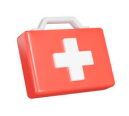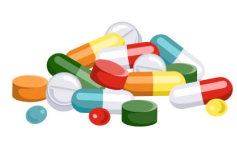Singapore General Hospital will NEVER ask you to transfer money over a call. If in doubt, call the 24/7 ScamShield helpline at 1799, or visit the ScamShield website at www.scamshield.gov.sg.
We’d love to hear from you! Rate the SGH website and share your feedback so we can enhance your online experience and serve you better. Click here to rate us
Verapamil
Isoptin
Uses
What is Verapamil for?
Verapamil is used to treat certain heart conditions such as irregular heartbeats. It can also be used to lower your blood pressure by relaxing and widening blood vessels.
How should I take or use Verapamil?
- Do not stop taking your medicine without checking with your healthcare provider
- This medicine can be taken with or without food.
- If you are taking a sustained release tablet, you should swallow the tablet whole. Do not chew or crush sustained release forms of verapamil
What should I do if I forget to take or use Verapamil?
If you miss a dose, take the missed dose as soon as you remember. If it is almost time for your next dose, take only the usual dose. Do not double your dose or use extra medicine to make up for the missed dose.
Precaution
What precautions should I take when taking or using Verapamil?
If you are pregnant or planning to get pregnant, you should inform your healthcare provider.
What food or medication should I avoid when I take or use Verapamil?
Avoid taking grapefruit when you are taking this medicine as grapefruit may interact with your medicine and increase the risk of side effects.
This medicine can cause the heart rate to be slower and should be used with caution with other medicines that slow the heart rate e.g. digoxin, beta blockers and amiodarone. If you are taking these medicines together, make sure you go back to your doctor for regular check-ups.
There may be several other medicines that affect the level of this medicine in your body. Please see your doctor or pharmacist before using any other medicines, including over-the-counter medicines, vitamins, herbal products and other traditional medicines. Please make sure that the doctor who treats you knows that you are on this medicine
Side Effects
What are some common side effects of Verapamil?
Leg swelling, headache and constipation (difficulties in passing stools) are some common side effects of this medicine. You may also experience dizziness and lightheadedness on getting up from a sitting or sleeping position. This medicine may decrease your heart rate
The symptoms of a drug allergy include one or more of the following:
- Swollen face/eyes/lips
- Difficulty in breathing
- Itchy skin rashes over your whole body
If you experience any of these symptoms, you should stop your medicine immediately and see your doctor.
Very rarely, this medicine can injure or damage the liver. A liver injury may recover on its own. However in some cases, it can cause serious liver damage. Stop this medicine and see a doctor immediately if you notice dark coloured urine or light coloured stools, or if you experience nausea, vomiting, loss of appetite, stomach pain or yellowing of your eyes or skin. This side effect has a very low chance of occurring. Most patients take this medicine with no problems. Check with your doctor or pharmacist if you have any concerns regarding your medicines.
Handling
How should I store Verapamil?
- Keep away from children
- Keep in a cool, dry place, away from direct sunlight
Throw away all expired medicines.
How do I throw away Verapamil safely?
Pack this medicine into a black trash bag and seal it tightly before throwing into the rubbish chute or bin.
For more information
What should I do if I overdose?
If you take more than the recommended dose, please seek medical advice immediately.
Disclaimers
If you take more than the recommended dose, please seek medical advice immediately. The information provided on this page does not replace information from your healthcare professional. Please consult your healthcare professional for more information.
This article is jointly developed by members of the National Medication Information workgroup. The workgroup consists of cluster partners (National Healthcare Group, National University Health System, and SingHealth), community pharmacies (Guardian, Unity, and Watsons), and the Pharmaceutical Society of Singapore. The content does not reflect drug availability and supply information in pharmacies and healthcare institutions. You are advised to check with the respective institutions for such information.
Last Updated on May 2019

Need More Medicine?
Use Medicine Order Service on HealthBuddy.

Medicines Reminder
Get reminders and chart progress on HealthBuddy.
Stay Healthy With
Outram Road, Singapore 169608
© 2025 SingHealth Group. All Rights Reserved.




















